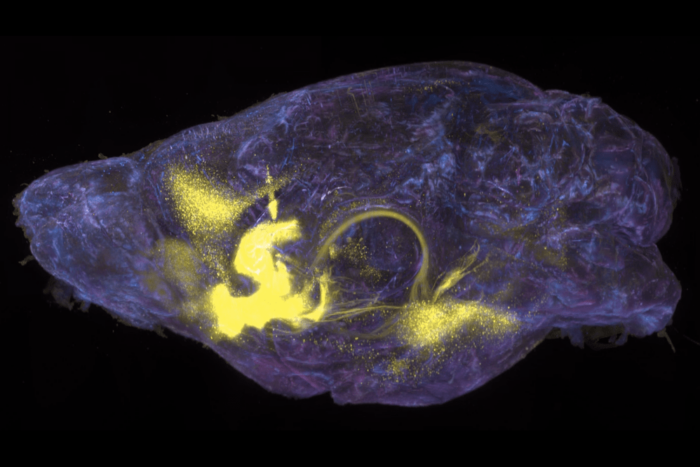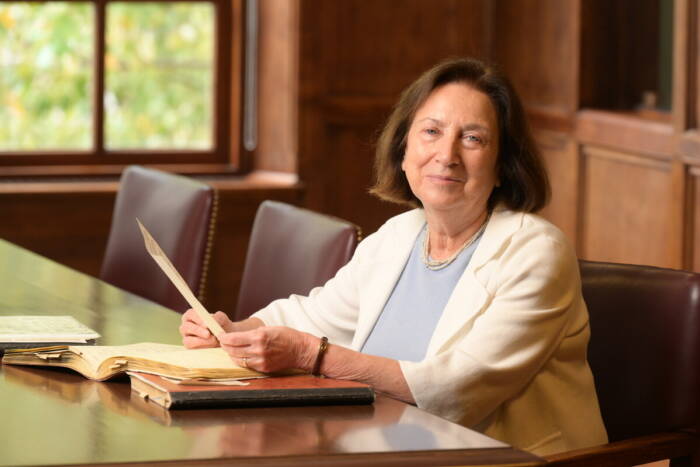David Rockefeller, university benefactor for 76 years, dies at 101
Russell L. Carson, chair of the Board of Trustees, and Richard P. Lifton, president, released the following statement today regarding the death of David Rockefeller:
The entire Rockefeller University community deeply mourns the loss of David Rockefeller, our beloved friend and benefactor, Honorary Chairman, and Life Trustee. During its long and storied history, no single individual had a more profound influence on the University than David. His inspired leadership, extraordinary vision, and immense generosity have been essential factors in the University’s success. His integrity, strength, wisdom, and judgment—and especially his unequivocal commitment to excellence—shaped the University and made it the powerhouse of biomedical discovery it is today.
One of the greatest philanthropists of our time, as well as one of the world’s foremost leaders in the spheres of finance, international relations, and public service, David Rockefeller dedicated his life to improving the world and the lives of all who share our planet. David was born in New York City in 1915, the youngest of Abby Aldrich Rockefeller and John D. Rockefeller, Jr.’s six children and a grandson of John D. Rockefeller. David was educated at Harvard University, the London School of Economics, and the University of Chicago, where he earned a Ph.D. in economics in 1940. That same year, he married Margaret “Peggy” McGrath. Their union lasted for nearly 56 years, until Peggy’s death in 1996. Together, Peggy and David raised two sons and four daughters. David’s entire business career was spent at Chase Manhattan Bank, where he ultimately served as Chairman and CEO, specializing in international banking.
As a philanthropist, he followed in the footsteps of his grandfather and father, serving as an active and generous steward of innumerable institutions and organizations across our country. The public good David achieved through his philanthropy is incalculable, and it is impossible to list here all the institutions, organizations, and programs that flourished with the help of David’s leadership and support. In New York City alone, David was involved with countless nonprofits. In 1958, he helped establish the Downtown-Lower Manhattan Association, whose proposals aided the redevelopment of lower Manhattan and led to the creation of the World Trade Center. In 1979, he formed the Partnership for New York City, an organization of business leaders who worked closely with government, labor, and the nonprofit sector to enhance the city’s leadership position as the global center of commerce, culture, and innovation. In addition to The Rockefeller University, New York’s Museum of Modern Art, which was co-founded by David’s mother, and the Council on Foreign Relations occupied special places in his heart.
David’s involvement with The Rockefeller University began in 1940, when he joined the Board of what was then known as The Rockefeller Institute for Medical Research. Founded by his grandfather in 1901, the Institute was the nation’s first institution devoted to biomedical research. From 1940 until his death on March 20, at the age of 101, this institution remained a central focus of David’s life. In 1950, he succeeded his father as Chairman of the Institute’s Board. In that capacity, he led the Institute through its visionary transformation into The Rockefeller University. Working closely with then-president Detlev Bronk, David helped establish the University’s world-renowned graduate program, which brought an invaluable infusion of youth and creative vibrancy to campus. From then on, training future generations of scientific leaders was integral to the University’s mission. In transforming The Rockefeller Institute into a premier graduate university in the biomedical sciences, David and Det Bronk enlisted the help of two other remarkable men—architect Wallace Harrison and landscape designer Dan Kiley. Harrison and Kiley designed the University’s mid-century campus, which to this day remains one of the most beautiful places in New York City. With its majestic trees and verdant landscape, the campus serves as a serene urban oasis that inspires the bold and imaginative science for which the University is known.
David stepped down as Chairman of the University’s Board in 1975. He continued to chair the Executive Committee for another 20 years. Throughout his life, he remained an active and generous steward of University affairs, building on the legacy he inherited from his father and grandfather. In 1980, the University awarded David an honorary degree. In 1995, at the age of 80, he was elected Honorary Chairman and Life Trustee. That same year, the University established The David Rockefeller Award for Extraordinary Service to The Rockefeller University. The award recognizes an individual from the University community who exemplifies the commitment to the institution made by David himself. Fittingly, in June 1995, David was the first recipient of the honor. Also in 1995, the University’s alumni created the David Rockefeller Fellowship, which is awarded annually to a third-year graduate student in recognition of outstanding scholarship, achievement, and citizenship. In 2001, the University established the David Rockefeller Professorship, currently held by Barry S. Coller, M.D., the physician-in-chief of The Rockefeller University Hospital. In 2005, to celebrate David’s 90th birthday, the University’s highly successful Ph.D. program was renamed the David Rockefeller Graduate Program to reflect his central role in its development.
The most precious gift that David gave the University was the gift of time. David was an active presence on campus, attending meetings, lectures, events, and concerts. He enjoyed talking with faculty, students, and staff; his enormous personal warmth and ability to connect with everyone he met was at the heart of the culture of civility and cooperation that is a hallmark of our great institution.
David Rockefeller’s magnificent generosity and stewardship has touched every aspect of The Rockefeller University—from its scientific and educational programs to its landscape, buildings, and art collection. David provided extraordinarily generous support for many different Rockefeller University initiatives, including a spectacular gift in 2005, which helped create the Collaborative Research Center and restore north campus buildings that were in disrepair. Most recently, David partnered with the Stavros Niarchos Foundation in making a transformative joint gift to help create the Stavros Niarchos Foundation–David Rockefeller River Campus. In designing the River Campus, architect Rafael Viñoly took advantage of the University-owned air rights over the FDR Drive, which David had the foresight to secure from the City of New York during the 1970s. The River Campus will add two acres to the University’s existing 14-acre campus by extending the grounds over the FDR Drive. The new campus will provide much needed, leading-edge laboratory space in the Marie-Josée and Henry R. Kravis Research Building, as well as many other amenities, ensuring that The Rockefeller University will remain the world leader in bioscience well into its second century and beyond.
David Rockefeller’s magnificent stewardship has influenced every aspect of The Rockefeller University—from its landscape, buildings, and art collection to its scientific programs and educational outreach. While it is impossible to imagine the University without David, he will live on in every scientific advance and breakthrough made in University laboratories, in every young Ph.D. candidate fortunate enough to participate in the David Rockefeller Graduate Program, and in the incredible beauty of our campus. We celebrate David as the exemplar of the University’s culture of excellence and scientific collaboration. We send our heartfelt condolences to David’s children, Peggy Dulany; Neva R. Goodwin; Eileen R. Growald; Abigail A. Rockefeller; and David Rockefeller, Jr., and their families. We also extend our deepest sympathy to the family of the late Richard G. Rockefeller.
Edited 3/21/2017


